

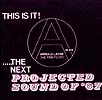 Pink Floyd's growing popularity with the 'underground'
eventually led to the recording of, Arnold Layne,
released in March 1967. Once on the British charts it
brought the band to the media's attention. The Piper
at the Gates of Dawn became one of the most beloved of
the U.K.'s contributions to the 'Summer of Love'.
Pink Floyd's growing popularity with the 'underground'
eventually led to the recording of, Arnold Layne,
released in March 1967. Once on the British charts it
brought the band to the media's attention. The Piper
at the Gates of Dawn became one of the most beloved of
the U.K.'s contributions to the 'Summer of Love'.
The album was recorded at Abbey Road Studios and at virtually the same time as the Beatles "Sgt. Pepper's Lonely Hearts Club Band".
Piper was a disappointment for some U.K. fans in the beginning, as it bore little resemblance to the drawn-out space jams they were then famous for, with the exception of the two tracks considered 'underground' anthems, Interstellar Overdrive, and Astronomy Domine. Throughout the album much of the band's instrumental sound is defined by Rick's reverb-drenched Farfisa organ, and the revealing lyrics of Syd...lyrics that became a window into his being, and that held out the promise of something greater that would never come to be.

Piper At The Gates of Dawn is the title of the
7th chapter in Kenneth Grahame's book, "The Wind in
the Willows", one of Syd's favorites.
Piper has been suggested to be the work on which Syd's 'mythic' reputation is almost completely based upon, and some fans feel it provided the blueprints for the albums that his band mates would continue to make in his absence.

Syd is believed to be responsible for the art work for
the back of the album cover. The actual front cover
was photographed by Vic Singh.
One of EMI's staff producers, Norman Smith (who
engineered every Beatle's album up to 'Rubber Soul'),
was one of the contingencies to Pink Floyd signing
with EMI. He was the man, they were told, who would
"keep a firm hand on the sessions". Joe Boyd, the man
who had worked with the band and assumed he would be
their record producer, was unceremoniously dumped.
Peter Jenner's voice is the one heard reeling off the
names of the celestial bodies through a megaphone on
Astronomy Domine in the studio version. The inspiration
for this piece has been assumed by a few to be from one
of Syd's first LSD experiences, mingled with his then
fledgling interest in astronomy. In truth however, it must
be taken only as speculation after the fact.
Although Astronomy Domine had been a staple song of
the band's gigs for several months, the final version
of it was the best take for the album.
Recording date: April 11, 1967 (4-track)
 The title and most of the lyrics of Chapter 24 are
directly from Chapter 24 of the I Ching, the 5,000 year
old Chinese Book of Changes, one of Syd's interests at
the time. That chapters title
The title and most of the lyrics of Chapter 24 are
directly from Chapter 24 of the I Ching, the 5,000 year
old Chinese Book of Changes, one of Syd's interests at
the time. That chapters title
'Fu' means change/success.
"Change returns success, action brings good fortune".
Recording date: March 15 and June 7, 1967
Pow R. Toc H. was renamed "The Pink Jungle" in the
'Journey' part of "The Man and The Journey". It's been
said that Pow R. Toc H..was a conscious effort by the
band to produce a sequel to 'Interstellar Overdrive'.
The title, by Roger, is meaningless. Pow R. Toc H. was the army
signallers code for TH, for the Talbot House, a club
where officer and enlisted men were equals. It later
became an Interdenominational Christian fellowship
organization serving the community. Pow R. Toc H. was added for
no other reason than it sounded right, according to R.
Waters.
Recording date: March 20-21, 1967 (4-track)
Lucifer Sam was originally titled 'Percy the Rat
Catcher'. Jenny Spires (Jenny Gentle) a girlfriend of
Syd's at the time, bits from the I Ching, and his own
ideas were mixed together as the inspiration for this
ode to Syd's cat.
Recording date: April 11, 1967
 The basic idea for Matilda Mother was from Hillaire
Belloc's children's verse 'Cautionary Tales'. When
performed live, Syd took verses straight from the book,
but after permission was refused to use the poem, Syd
wrote his own version. The instrumental jam in the
middle, which at the time would go on for ten, fifteen,
or more minutes on stage, was cut short by Norman Smith.
The basic idea for Matilda Mother was from Hillaire
Belloc's children's verse 'Cautionary Tales'. When
performed live, Syd took verses straight from the book,
but after permission was refused to use the poem, Syd
wrote his own version. The instrumental jam in the
middle, which at the time would go on for ten, fifteen,
or more minutes on stage, was cut short by Norman Smith.
Recording date: June 7 & 29, 1967
Flaming was another of Syd's creations before (the)
Pink Floyd had come together, and another invocation of
childhood. Syd's title choice was taken from a piece he
had heard in a jazz free form group's (AMM) sessions he
had attended much earlier. There have been some reports
that have given the impression that the title was taken
from what was described as a sensation experienced from
LSD. This is incorrect.
Recording date: June 7 & 27, 1967

Take Up Thy Stethoscope And Walk was the first Roger
Waters composition to be recorded. The song was another
attempt to recreate their on stage sound, but, Norman
Smith cut the middle section and the edit is clearly
heard in the stereo mix.
Recording date: March 20, 1967
| The Scarecrow. According to Peter Jenner, he remembers
the lyrics being taken from Syd's notebook (ring binder)
and laid over a simple AEGD chord progression. Jenner also
said that it was quite possible that Syd was the scarecrow.
Like 'Vegetable Man', Jenner thought Syd was writing
subconsciously about himself. The children's book, 'The
Scarecrow' by June Wilson also has roughly the same story line
as the song, so it's possible Syd could have also taken his
inspiration from that. This track was the B-side to See Emily Play. Recording date: March 20, 1967 |
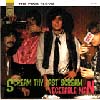 |
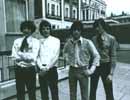 The working title for Bike was simply 'The Bike Song',
and was written for Syd's girlfriend, Jenny Spires. Some
see it as about as close to a love song as Syd ever came,
a touching attempt to share those things that were special
to him with the one he thought fit into his 'world'. It
starts out simply enough and then becomes increasingly
bizarre. "It's the most fantastical muddle of sounds and
time signatures, yet somehow Syd makes it all make perfect
sense." Bike was one of the last tracks where Syd was
truly in control. [Norman Smith]
The working title for Bike was simply 'The Bike Song',
and was written for Syd's girlfriend, Jenny Spires. Some
see it as about as close to a love song as Syd ever came,
a touching attempt to share those things that were special
to him with the one he thought fit into his 'world'. It
starts out simply enough and then becomes increasingly
bizarre. "It's the most fantastical muddle of sounds and
time signatures, yet somehow Syd makes it all make perfect
sense." Bike was one of the last tracks where Syd was
truly in control. [Norman Smith]
Recording date: April 18 & May 21, 1967
Interstellar Overdrive had been recorded twice before
the Abbey Road sessions...once at Thompson Private
Recorders and with Joe Boyd at Sound Techniques.
Interstellar Overdrive was the track that defined Pink
Floyd's early music. On stage it was often played for a
half hour or more, and helped pave the way towards the
abandonment of conventional musical structures that began
in earnest in the mid-sixties.
Recording Info: The track was recorded onto two of the
four tracks available and then over dubbed with a second
set of guitar, bass and keyboard parts onto the remaining
two tracks, double tracking the whole performance.
Recording date: February 27, 1967

The Gnome is said to have been inspired by J.R.R. Tolkien's
'Lord of the Rings', with a touch of Kenneth Grahame's 'Wind
in the Willows'. The song is a loose description of the
journey of Frodo, the gnome who goes on a 'big adventure'.
Recording date: March 20, 1967
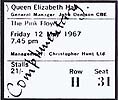
See Emily Play was a reworked version (at Jenner and
King's suggestion) of 'Games For May' which was written and
performed at the 'Free Games For May' event, Queen Elizabeth
Hall, in May of 1967.
 See Emily Play was recorded half-way
through the Piper sessions. Syd laid down most interesting
slide work using a Zippo lighter, an idea probably borrowed
from AMM. David Gilmour dropped into the studio to see his
friend Syd during this recording session.
See Emily Play was recorded half-way
through the Piper sessions. Syd laid down most interesting
slide work using a Zippo lighter, an idea probably borrowed
from AMM. David Gilmour dropped into the studio to see his
friend Syd during this recording session.
Recording date: May 21, 1967
The band worked throughout 1967, even while recording Piper. At the end of 1967 the band went to the U.S. for a scheduled tour. They did their California performances as well as the disastrous Dick Clark Bandstand and Pat Boone television shows in which the latter prompted Andrew King to cancel the rest of the visit because of Syd's lack of performance.

In mid-November the band joined up with the Hendrix tour which finally ended
the first of December. Pink Floyd played 16 Venues and over 30 concerts in 21 days.
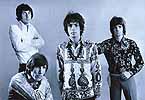
After the Hendrix Tour, the band was exhausted, it was now
obvious that Syd could not go on much longer if at all, and
the price to be paid for making it 'big' was making itself
clear.
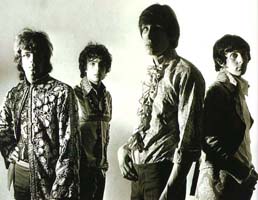
"It is perhaps fairer to say that in the beginning of Pink Floyd there was Syd. Prior to his arrival, the band comprising Roger, Rick and Nick, and Bob Klose, and Juliette, and Chris Thomson and other now ghostly figures who drifted in and out, was not only called by other names, but also played different kinds of music." -S. Thorgerson
"It was great when Syd joined. Before him we'd play the R&B classics, because that's what all groups were supposed to do then. With Syd the direction changes, it became more improvised around the guitar and keyboards. Roger started playing the bass as a lead instrument, and I started to introduce more of my classical feel." -R. Wright
"That was very difficult in some ways, getting used to the studios and everything. But it was fun, we freaked about a lot. I was working very hard then, there's still lots of stuff lying around from then, even some of the stuff on "The Madcap Laughs". -S. Barrett, on 'Piper'
"All that stuff about Syd starting the space-rock thing is just so much fucking nonsense. He was completely into Hillaire Belloc, and all his stuff was kind of whimsical, all fairly heavy rooted in English literature. I think Syd had one song that had anything to do with space, 'Astronomy Domine', that's all. That's the sum total of all Syd's writing about space and yet there's this whole fucking mystique about how he was the father of it all. It's just a load of old bollocks, it all happened afterwards. There's an instrumental track which we came up with together on the first album, 'Interstellar Overdrive', that's just the title, you see, it's actually an abstract piece with an interstellar attachment in terms of its name." -R. Waters
"But the choice of material was restricted, I suppose, by the fact that both Roger and I wrote different things." "...perhaps the way we started to play wasn't as impressive as it was to us, even, wasn't as full of impact as it might have been. I mean, it was done very well rather than considerably exciting. One thinks of it all as a dream." -S. Barrett
"It was a bloody stupid deal, we all went in there and signed the contract and then they wheeled in Norman "Hurricane" Smith and said he was going to be our producer. It was all jolly nice and polite." -R. Waters
"We were given Norman Smith by EMI, no arguments. So Joe Boyd, our original producer, got written out of the thing. Norman was more interested in making us sound like a classical rock band. It was a bit like the George Martin thing, a useful influence to have. But I think Joe would have given Syd his head, let him run in a freer way." -N. Mason
"I remember the first sessions we did at Abbey Road on four-track. The Beatles were making 'Sgt. Pepper' in the other studio. At about five-thirty in the afternoon, Ringo, Paul and George came into our studios and we all stood rooted to the spot, excited by it all." -R. Waters
"We spent three months recording it, which was quite a long
time in those days. Bands used to have to finish albums in
a week, with session players brought in to play the
difficult bits. But because The Beatles were taking their
time recording Sgt Pepper in the studio next door, EMI
thought this was the way people now made records. We were
taken in to meet them once, while they were recording
'Lovely Rita'. It was a bit like meeting the Royal family."
-N. Mason
"It was really extraordinary because the Floyd were so naive. They were saying 'can you hear me?' because of the soundproof glass, not realizing that the mikes were on. It was completely innocence, very touching really." -Barry Miles
"I'm sure the Beatles were copying what we were doing, just as we were copying what we were hearing down the corridor." -P. Jenner
"Syd's songs of that period were a real cornucopia, he was always coming up with these whimsical songs with a nursery feel, that were rooted in the things he had read as a child, overheard or seen. Mix that all up with drugs and the Beatles and you have Syd." -S. Thorgerson
"Fairy-tales are nice. I think a lot of it has to do with living in Cambridge, with nature and everything. It's so clean and I still drive back a lot. Maybe if I'd stayed at college, I would have become a teacher. Leaving school and suddenly being without that structure around you and nothing to relate to...maybe that's a part of it, too." -S. Barrett
"Syd was really amazing though. I mean, his inventiveness was quite astounding. All those songs from that whole Pink Floyd phase were written in no more than six months. He just started and took it from there. His influences were very much the Stones, The Beatles, Byrds and Love. Syd was no guitar hero - never remotely in the class of Page or Clapton, say, (but) he had this technique that I found very pleasing." -P. Jenner
"Very important. I think it's good if a song has more than one meaning. Maybe that kind of song can reach far more people, that's nice. On the other hand, I like songs that are simple. I liked Arnold Layne because to me it was a very clear song." -S. Barrett, on the importance of lyrics
"We are relying a lot on our album to show what we're really trying to say. Our album shows part of the Pink Floyd that hasn't been heard yet." -N. Mason
"A lot of stuff on our LP is completely impossible to play live. We've got the recording side together and not the playing side." "The audiences really hated us. We thought, 'all right, 'See Emily Play' was a nice single but not the sort of thing a chap wants to play'..so we wouldn't play it, and they threw beer cans and coins at us." -R. Waters on the response from UFO crowd who thought the album did not adequately represent the groups sound.
"We're really a young group, not in age but in experience. We're trying to solve problems that haven't existed before. Perhaps we should stop trying to do our singles on stage." -R. Waters
"What else could he have done after that? He'd already defined it all. There's nothing ever been done on God's earth like that- that's Art." -Mick Rock, speaking of his friend Syd
"And the great thing with Syd was that he had a twinkle in his eye; he was a real eye-twinkler. He had this impish look about him, this mischievous grin. And he came by and I said, 'Hi Syd!' And he just kind of looked at me. I looked right in his eye and there was no twinkle-no glint. It was like somebody had pulled the blinds-you know, 'nobody home'." -Joe Boyd, about Syd at the UFO club the month before Piper was completed.
"We're being frustrated at the moment by the fact that to stay alive we have to play lots and lots of places and venues that are not really suitable. This can't last, obviously, and we're hoping to create our own venues." -R. Waters
"We can't go on doing clubs and ballrooms. We want a brand new
environment and we've hit on the idea of using a big top.
We'll have a huge tent and go around like a travelling circus.
We'll have a huge screen 120 feet wide and 40 feet high inside
and project films and slides. We'll play the big cities or
anywhere and become an occasion just like a circus. It'll be
a beautiful scene. It could even be the salvation of the
circus." -R. Waters comment, 1967.